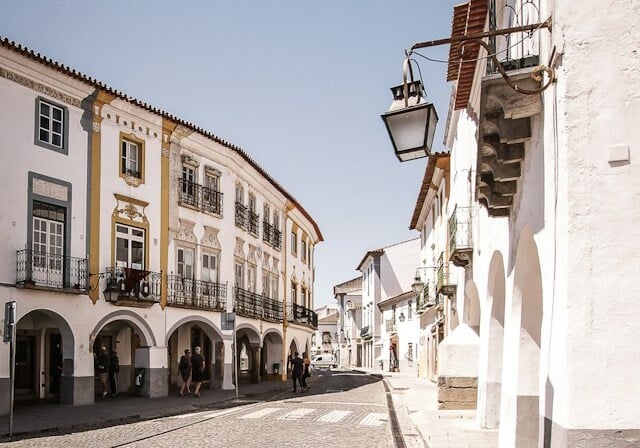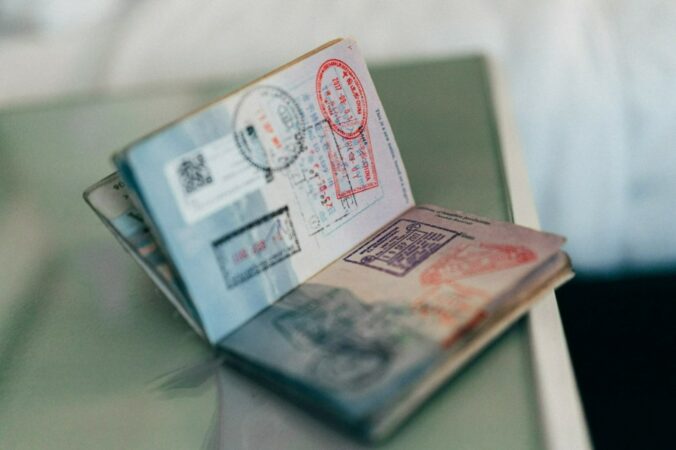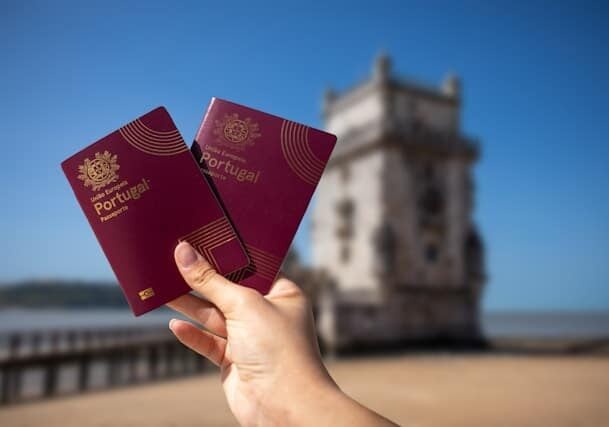Updated: July 21, 2025
Portugal immigration has been a hot topic in recent years, particularly with the country’s growing popularity as a destination to work, retire, or raise a family.
Curious about how to immigrate to Portugal and become a Portuguese resident? In this article, you’ll find everything you need to know about entering Portugal and the process of immigrating to the country, including Portuguese visa options, timelines, and requirements.
Do you need a visa to immigrate to Portugal?

Citizens from the EU, European Economic Area (EEA), or Switzerland can enter Portugal without a visa and stay for up to 90 days using just a valid ID or passport. If you want to stay longer, you will need to register for a residency certificate at their local city council (Câmara Municipal). After five years, they can apply for permanent residency.
Non-EU citizens follow a different process depending on their home country. Some countries, like the USA, UK, Canada, Australia, and New Zealand, have agreements with Portugal that allows citizens from these countries to visit without a visa for short stays (up to 90 days in a 6-month period). Other non-EU countries do require a visa even for short visits.
For stays longer than 90 days, all non-EU citizens must apply for a Portuguese residency permit. After five years of legal residence, they can apply for permanent residency or citizenship.
Required documents to get a Portugal residence visa
Any visa you apply for will require you to submit a Portugal visa application form to the Portuguese Embassy or Portuguese Consulate in your country of residence. If there is no Embassy, check the Portuguese Embassies in nearby countries.
It is essential you have the appropriate visa for your personal situation. Visa processing times can take anywhere from two weeks to three months, so make sure to start your Portuguese visa application process to allow for this time.
For your application, you will generally need the following documentation:
- Two passport-sized photos
- Your passport, valid for at least three months after your planned stay
- A completed visa application form
- Travel insurance that covers you while in the Schengen Area
- Cover letter stating the purpose of your visit and your itinerary
- Accommodation plans during your stay
- Proof of sufficient funds to support you during your stay
- A clear criminal record
- In some cases, proof of a return ticket
Depending on the type of visa you are applying for, you may need to show proof of a booked return flight and provide details of your flight times and dates.
You may also be asked to present extra documentation regarding your specific visa application. For example, if you’re a student, you must show proof of your enrollment at a Portuguese education institution.
Portugal Immigration: The Four Main Visa Types
The type of Portuguese visa you can apply for will depend on your unique situation. Fortunately, Portugal offers a few visa options to choose from:
- Schengen short stay visa
- Temporary stay visa
- Portuguese residency visa
- Portugal work visa
Let’s take a more detailed look at each of these Portuguese visas.
Schengen short-stay visa
The Schengen Visa is for you if you want to visit Portugal and travel freely within the 26 Schengen countries that make up the Schengen Area. The Schengen Visa is valid for 90 days during a six-month period; you can choose between the following types of Schengen Visa:
- Airport transit visa (Visa A): This Schengen country airport visa allows travel from one flight to another within the international area of an airport. Required for all passengers changing flights in the airport of a Schengen country, unless exempted.
- Transit and short-term stay visa (Visa C): Issued for transit and short-term stays in the Schengen Area and valid for 90 days within a six-month period. The most common short-term stay visas are the Portuguese tourist visa and business visa.
- Limited Territorial Validity (LTV) visa: A special short-stay visa allowing travel to one Schengen state or certain multiple Schengen states if specified beforehand.
Temporary stay visa

- Medical treatment or accompanying a family member undergoing medical treatment
- Transfer of workers providing services or training between countries within the World Trade Organization (WTO)
- Temporary employment or self-employment
- Conducting scientific research or teaching in a higher education institution
- Pursuing sports activity
Portuguese residency visa

- Employed work
- Self-employment or entrepreneurial activities
- Higher education programs for students who want to further their studies and already reside in Portugal
- Study, student exchange, internship, or voluntary services
- Scientific research or teaching
- Family reunion
- Pensioners and people with an income to support them during their stay in Portugal
The Portuguese residency visa can be issued as a multiple-entry visa that allows travel within the Schengen Area. No matter your residency visa, you will need to apply for a residence permit once you have entered Portugal. After five years with this temporary residence visa, you can then apply for permanent residency and Portuguese citizenship, provided you meet all the requirements under immigration law and Portuguese nationality law.
For more information, take a look at our article on how to get Portuguese residency.
Portugal work visa
Your nationality and the period you will be employed will determine whether you require this visa. There are a few national visa options for non-EU nationals:
- Short-term work visa: This applies to work contracts lasting six months or less and is available to employees and self-employed workers. You can extend this visa for a year.
- Long-term Portugal online worker visa: Required for non-EU nationals looking to work long-term in Portugal. Classified as a type D Schengen Visa, it allows visa-free travel across the Schengen Area.
Best Visas for Getting Residency in Portugal in 2025
For non-EU citizens looking for long-term residency in Portugal, there are many national visas you can apply for, like the D7 Visa and Portugal Golden Visa. It is important to understand your options before beginning your application. Below, we explore some of the Portugal residency visa options available.
 D7 Visa
D7 Visa
The D7 Visa, or passive income visa, allows non-EU citizens to gain Portuguese residency as long as they can provide proof of sufficient funds from passive income sources to support them during their time in Portugal. This income can come from a pension, rental income, dividends, investment income, intellectual property, or movable property.
This visa is an attractive option for retirees, self-employed individuals, entrepreneurs, and anyone interested in Portugal immigration with zero investment. You can also include your family in the visa application.
You can renew the D7 Visa after the second year, which is then valid for a further three years.
Unlike the Portuguese Golden Visa, obtaining the D7 Visa does not require a financial investment in Portugal; instead, it mandates that the applicant can prove a steady stream of passive income equal to or more than the Portuguese minimum wage (€870 per month) and enough savings to support yourself in the country. Check out our guide to Portugal’s D7 Visa for more information.
 Portugal Golden Visa
Portugal Golden Visa

Besides having a clean criminal record, being a non-EU/EEA/Swiss national, and meeting the investment requirements, this visa option also requires you to spend an average of seven days per year in Portugal (14 days over its two-year validity). You can find more information about the Portugal Golden Visa program in our guide.
D8 Visa for Digital Nomads
Portugal’s Digital Nomad Visa is for remote workers who are employed by companies outside of Portugal, freelancers who offer services to clients worldwide, and tech professionals involved in start-ups or technology-related ventures who wish to reside in Portugal while managing their remote business.
To qualify for this visa, you’ll need to prove that you can support yourself by earning at least four times the minimum wage in Portugal, which is around €3,480 per month.
The D8 Visa allows multiple entries into Portugal and the opportunity to apply for a residence permit. This means you’ll be able to live in Portugal while having the flexibility to travel when necessary and renew your residency status according to what suits you best.
D2 Startup Visa
The Portugal D2 Visa also goes by the startup or entrepreneur visa and is aimed at those wanting to start a business in Portugal or purchase an existing Portuguese company.
To qualify, you’ll need to make sure you have enough money to sustain yourself for one year and develop and run your business while in Portugal. Before applying, you will need to have your business idea approved by the IAPMEI body.
The visa is valid for four months but can be extended up to two years with an application for a residence permit.
D3 Tech Visa
The Portuguese government introduced this visa to attract highly qualified tech professionals to Portugal. Nationals who are not a part of the Schengen Area and technology specialists are welcome to apply. You must meet the following set of Portugal immigration requirements to qualify for the Portugal D3 Visa:
- The applicant must be a third-country national who resides in a territory that is not part of the EU
- All tax obligations must be fulfilled.
- The applicant must have a clean criminal record and be at least 18 years of age when applying for the visa.
- The applicant must have completed a Bachelor’s degree or an equivalent level – level six, according to ISCED 2011, or level five, tertiary level education, with five years’ experience in specialized technical functions.
- Be proficient in Portuguese, English, French, or Spanish at a level appropriate to the functions and duties to be performed.
D6 Family Reunification Visa
The D6 Visa, or Family Reunification Visa is a temporary residence permit you can get if you have family members who are Portuguese residents. Residence permits for family members will be valid for the same amount of time as your family member who already has their Portuguese residence permit.
Qualifying family members include spouses, partners recognized by law, dependent children of the resident or resident’s partner, and minor siblings of the resident.
When applying for this visa, the Portuguese resident family member will show evidence of the relationship (e.g., birth certificate, marriage certificate, etc.) and prove they have the means to support their family members in the country.
Portugal Immigration Requirements: Permanent Residence and Portuguese Citizenship
As we have already mentioned, after five years of legal residency in Portugal, you will have the option to apply for permanent residence or citizenship. Below, we explore the process for each pathway.
 Portugal permanent residency requirements
Portugal permanent residency requirements

- Valid residence visa
- Valid passport or travel ID
- Two passport photographs
- Proof of sufficient finances to support yourself
- Proof of accommodation
- Proof of private health insurance with medical treatment coverage
- Criminal record certificate
- Proof of enrolment in the social security scheme
- Proof of tax status
- Proof of legal and uninterrupted residence in Portugal for the preceding five years
- Proof of reason for any lengthy absence from Portugal during these five years, e.g., for work or medical reasons
- Proof of basic proficiency in the Portuguese language, such as a certificate of qualification or test at a language assessment center
Portuguese Citizenship Requirements
Another option after maintaining five years of legal residency in Portugal through the residency visas is to become a Portuguese citizen through naturalization. This includes the Golden Visa, as long as you maintain your investment and continue to meet the residency requirements over the period.
You will be able to apply for Portuguese nationality and obtain your Portuguese passport after the five years, provided you meet the requirements, such as having a clean criminal record and proving basic proficiency in the Portuguese language. Once granted, you’ll have the same rights and benefits as any other Portuguese national.
New Changes in Portugal's Nationality Law
Portugal’s parliament has approved changes to its nationality law that will benefit many Golden Visa and D7 Visa applicants facing delays in residency approvals. Previously, the five-year residency requirement for citizenship began only after receiving a residency permit.
Under the new rules, the wait time between applying for a temporary residency permit and receiving it will now count toward the five years, provided the permit is eventually granted.
This means that people applying for residency in 2025 could be eligible for Portuguese citizenship by 2030, even if there are delays in processing. The update aims to make the path to citizenship easier and fairer for those moving to Portugal.
Can you have dual citizenship in Portugal?
Yes, Portugal allows dual citizenship. The country does not require individuals to renounce their previous citizenship when obtaining Portuguese nationality. However, you will need to make sure that the policies of your home country also allow dual citizenship.
Portuguese Language Proficiency Requirements
When applying for citizenship, you will need to pass a basic Portuguese language proficiency test if you are from a country where Portuguese is not the main language spoken.
However, applicants from former Portuguese colonies, such as Brazil, Angola and Mozambique, among others, may not need to complete the test.
Understanding Taxes in Portugal for Expats
To understand your tax obligations in Portugal, you need to know if you’re a tax resident. Tax residents are taxed on all income worldwide, including money earned abroad, while non-residents are only taxed on income earned in Portugal, usually at a flat rate of 25 percent for work income and 28 percent for investments.
Being a tax resident is different from holding a residence visa. You’re considered a tax resident if you spend more than 183 days in Portugal in a 12-month period or if you have a permanent home in Portugal.
Income taxes for expats
If you are a tax resident in Portugal, your Individual Income Tax is calculated at rates ranging from 13 to 48 percent, and applied to all income earned, including:
- Employment income
- Self-employment income
- Investment income
- Rental income
- Capital gains
- Pensions
The tax incentive replacing the Non-Habitual Residency (NHR) Program
From 2009 to 2024, expats in Portugal enjoyed tax advantages through the Non-Habitual Residency (NHR) Program. However, this program has officially ended.
In its place, the new Tax Incentive for Scientific Research and Innovation, also referred to as the NHR 2.0 in Portugal, was introduced, which offers significant tax benefits for highly qualified professionals.
Get in Touch with Our Portugal Immigration Team
For help with your journey of immigrating to Portugal, contact Global Citizen Solutions, our Residency and Citizenship division. Global Citizen Solutions is a boutique investment migration consultancy firm focused on finding the right residency or citizenship program for individuals wishing to secure their future and become global citizens.
Then, to meet your accommodation requirements for your visa application, allow Goldcrest to help. Goldcrest is a local buyer’s agent situated in Portugal. We provide insightful real estate expertise and strategic advice. Whether you’re looking to buy or rent property in Portugal, our team of experts can help you find the right property without the hassle or fuss.
Frequently Asked Questions about Portugal Immigration
Is it easy to immigrate to Portugal?
Yes, Portugal is easy to immigrate to, provided you meet all the visa requirements to move to Portugal and can provide the necessary documents based on the type of visa you are applying for.
How does Portuguese immigration work for non-EU nationals?
To immigrate to Portugal as a non-EU national, you must apply for a visa that allows you a short-term or long-term stay, depending on whether you are immigrating for work, to retire, or through an investment. Once you have secured your visa to enter Portugal, you will need to apply for a residence permit to live in the European country long term.
Is Portuguese immigration friendly?
Yes, Portugal is immigration-friendly. There are many visa options that you can apply for to immigrate to Portugal, such as the D7 Visa, the Portugal Golden Visa, and the Digital Nomad Visa.
How much money do you need to immigrate to Portugal?
The amount of money required to immigrate to Portugal can vary depending on factors such as visa type, family size, and individual circumstances. Generally, applicants should demonstrate sufficient funds to cover living expenses.
With the Golden Visa, for example, you will need to invest a significant amount in the country, while for the D7 Visa, you simply need to show you have sufficient passive income to support yourself and your family.
How to become a permanent resident in Portugal?
To become a permanent resident, you must legally live in Portugal for at least five years under a temporary residence permit. During this time, you must maintain legal residency, renew your residence permits as required, have a clean criminal record, and demonstrate cultural integration (basic Portuguese language proficiency is required).
What Portugal visa lets me become a permanent resident?
Most long-term visas that lead to temporary residency, like the D7 (passive income), D2 (entrepreneur), and D8 (digital nomad) national visas, can eventually lead to permanent residency after five years.
What is the Portugal Golden Visa?
The Golden Visa is a residency-by-investment program that allows non-EU citizens to obtain a residence permit by making a qualifying investment in Portugal. It requires minimal physical presence (seven days per year on average) and can lead to permanent residency or the same citizenship as Portuguese nationals after five years.
What is a temporary residence permit for Portugal?
A temporary residence permit allows non-EU citizens to legally live in Portugal for one or two years (renewable). You will need to apply for one after you enter Portugal with a valid residence visa.
What are the Portugal residence visa requirements?
Requirements and documents typically include:
- Two passport-sized photos
- Your passport, valid for at least three months after your planned stay
- A completed visa application form
- Travel insurance that covers you while in the Schengen Area
- Cover letter stating the purpose of your visit and your itinerary
- Accommodation plans during your stay
- Proof of sufficient funds to support you during your stay
- A clear criminal record
- In some cases, proof of return ticket
Do I need a visa to enter Portugal?
EU/EEA/Swiss citizens do not need a visa. Citizens of countries like the US, Canada, and the UK can enter visa-free for up to 90 days. Others need a short-stay Schengen Visa or a long-stay residence visa, depending on the purpose of travel.
How many types of visas are there in Portugal?
Portugal offers four types of visa options to choose from:
- Schengen short stay visa
- Temporary stay visa
- Portuguese residency visa
- Portugal work visa
Which is the best visa for Portugal?
The best visa will depend on your situation. Retirees/passive income earners typically choose the D7 Visa, digital nomads opt for the D8 Visa, the D2 Visa is great for entrepreneurs, and the Golden Visa is ideal for investors who prefer short minimum stay requirements in the country.
What is a Type C Visa in Portugal?
A Type C visa is a short-stay Schengen visa valid for up to 90 days within a 180-day period. It’s generally used for tourism, business, or family visits.
What are the immigration policies for Portugal in 2025?
As of 2025, Portugal immigration policy is quite open and straightforward. It promotes legal immigration for work, investment, family reunification purposes, and study, while also offering digital nomad and startup pathways.
New rules have been introduced to streamline processes, especially for visa holders waiting to qualify for citizenship or permanent residency. The wait time between applying for a temporary residency permit and receiving it now counts toward the required five years, provided the permit is approved.
Can I bring my family members with me when immigrating to Portugal?
Yes. Once you hold legal residency, you can apply for family reunification for your spouse, children, and parents.
Is it necessary to learn Portuguese to immigrate to Portugal?
Not for entry, but basic proficiency is required for permanent residency and citizenship. Language skills also help with integration and daily life, so it is wise to start learning the basics as soon as possible, especially if you intend to stay in Portugal long-term.
Are there any age restrictions for immigration to Portugal?
There are no strict age limits. However, visa type and requirements may vary by age. For example, you will need to be of working age to get a job offer needed to qualify for a work visa.
What are the tax implications of immigrating to Portugal?
Portugal taxes its tax residents on worldwide income but has treaties to avoid double taxation. The new Tax Incentive for Scientific Research and Innovation also offers significant tax benefits to those who qualify.
Can I bring my pets with me when immigrating to Portugal?
Yes, bringing your pet is possible, but there are certain regulations to follow. Pets must have a microchip, rabies vaccination, and EU pet passport or health certificate.
Can a US citizen immigrate to Portugal?
Yes, like any other non-EU national, US citizens can apply for residence visas to immigrate to Portugal.
How does Portuguese culture differ from that of the US, UK, and other European cultures?
Portuguese culture emphasizes family, tradition, and a slower pace of life. It’s more relaxed and communal than the US and UK, with strong Catholic influences.
What support services are available for immigrants in Portugal?
Portugal offers a range of support services for immigrants, including social, psychological, legal, and professional integration support.
These services are provided by both governmental and non-governmental organizations, such as the Jesuit Refugee Service (JRS), the High Commission for Migration (ACM), and various local support centers.
What are the legal requirements for opening a business in Portugal as an immigrant?
You need a Portuguese tax number (NIF), a business plan, proof of funds, and you must register with the Portuguese Commercial Registry.
What are the most common reasons for visa denials in Portugal?
- Incomplete documentation
- Insufficient funds
- Criminal record
- Inadequate housing
- Lack of visa-specific eligibility
Can I drive with my US driver's license after moving to Portugal?
You can drive for up to 185 days as a non-resident. If you become a resident, you can use your US license for two years before you’ll need to get a Portuguese one, as Portugal has a bilateral agreement with the US.
How can I get a NISS social security number in Portugal?
You apply at a local Social Security office (Segurança Social) with your residence permit, passport, and proof of address or employment. You can also apply online, or, if you are working for a Portuguese company, you employer will get one for you.
How long does it take to immigrate to Portugal?
It varies by visa type, but expect your visa to be processed between two weeks to three months, and the full immigration process to take anywhere from six months to one year.
Can I immigrate to Portugal without a job?
Yes. A visa like the D7 Visa does not require a job if you have a sufficient passive income source. However, you must show sufficient financial means.
What are the best visas for retirees to immigrate to Portugal?
The D7 visa is the most popular for retirees with pensions or passive income. It requires proof of stable income and accommodation in Portugal.
Can I immigrate to Portugal as a freelancer or digital nomad?
Yes. The D8 visa allows remote workers and freelancers to live in Portugal if they meet minimum income requirements and work for non-Portuguese clients and companies.
What are the benefits of immigrating to Portugal?
- High quality of life
- Low cost of living
- Access to EU travel
- Mild climate
- Safety and healthcare
- Straightforward path to citizenship in five years
How can I immigrate to Portugal from the USA, UK, Canada, India, or South Africa?
- Apply for a residency visa at a Portuguese consulate.
- Enter Portugal and apply for a residence permit at AIMA.
- Renew and continue to meet requirements for residency for as long as you intend to live in the country.
- Apply for permanent residency or citizenship after five years.
How do I migrate to Portugal for work?
Secure a job offer from a Portuguese employer, then apply for a work visa (either short-term or long-term). You’ll need a work contract and proof of qualifications.
Can I immigrate to Portugal as a student?
Yes, you can apply for a student visa if you’re accepted into a Portuguese university or accredited program.
What is the Portugal D7 Visa for passive income holders?
The D7 Visa is for those with a stable passive income, like pensions, rental income, or dividends. It allows long-term residency to immigrate to Portugal.
What is the difference between the Portugal D7 and D2 Visa?
The Portugal D7 Visa and D2 Visa are two different paths to residency in Portugal. The D7 Visa is for passive income earners, like retirees, while the D2 Visa is for entrepreneurs and establishing a business in Portugal.
Do I need health insurance to immigrate to Portugal?
Yes, you must have valid health insurance when applying for a visa and residence permit in Portugal.
Can I buy property in Portugal to immigrate?
Buying property doesn’t grant residency in Portugal. However, owning property can support visa applications by demonstrating proof of accommodation in the country.
How does Portugal’s immigration policy compare to other EU countries?
Portugal is among the most welcoming EU countries, offering relatively simple paths to residency, family reunification, and citizenship with low physical presence requirements.
Can I immigrate to Portugal with a criminal record?
It depends. Minor offenses may not disqualify you, but serious or recent convictions can lead to visa denial. It is best to consult immigration experts, like those at Global Citizen Solutions, who will be able to look at your unique situation and provide accurate advice.
How strict are Portugal’s immigration laws?
Portugal has structured but flexible immigration laws. They emphasize integration, legal compliance, and humanitarian support.
What happens if my Portugal immigration application is denied?
You can appeal against the decision or reapply with corrected documents, depending on the reason for your denial. Legal help may be beneficial in complex cases.
How can I extend my visa after immigrating to Portugal?
You apply for a residence permit renewal through AIMA (Agency for Integration, Migration, and Asylum) in Portugal before it expires, typically showing continued eligibility and updated documentation.
Can I immigrate to Portugal as a refugee or asylum seeker?
Yes. Portugal accepts asylum seekers under international law. You can apply as a refugee or asylum seeker to AIMA (Agency for Integration, Migration, and Asylum) in Portugal.
What is the Portugal HQA visa for highly qualified individuals?
The Portugal HQA Visa is for highly qualified individuals seeking residency in Portugal. It forms part of the Portugal D3 Visa.
Can I immigrate to Portugal on a tourist visa and change my status?
No, you must apply for a residence visa from your home country. Switching status from a tourist visa while in Portugal is not generally allowed.
What are the best cities in Portugal for immigrants?
Lisbon, Porto, cities in the Algarve region, Braga, and Coimbra are some of the best places for immigrants to live in Portugal.
Can I immigrate to Portugal with a remote job?
Yes, the D8 Digital Nomad Visa is designed for remote workers and freelancers who earn a stable income from outside Portugal.